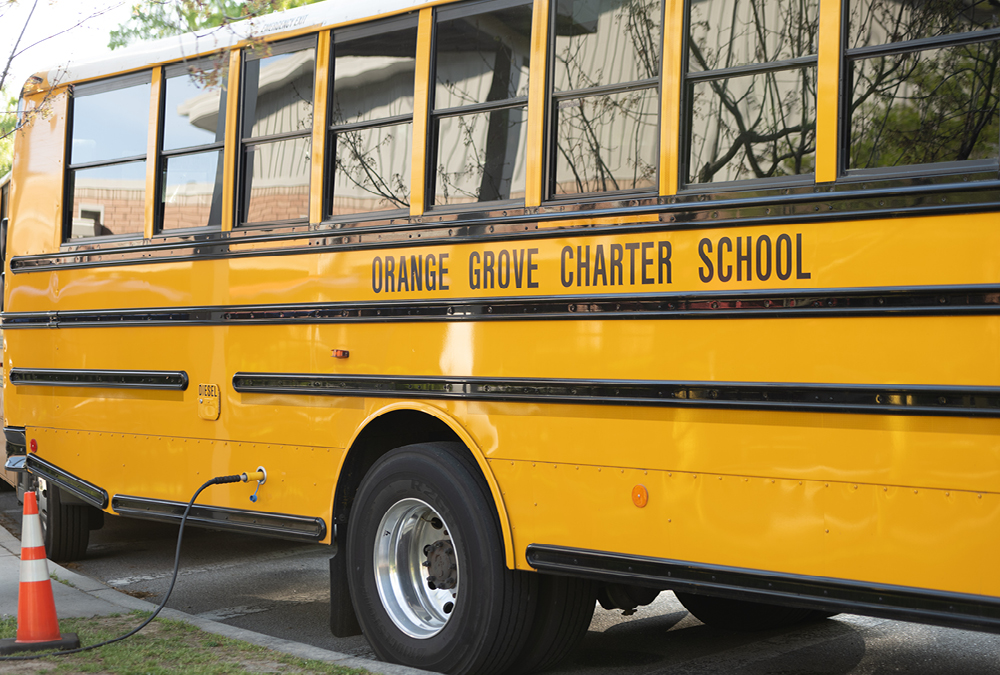Orange Grove Charter School goes Green(er) with school bus that runs off renewable natural gas
by Jenny Peterson | Staff Writer
It’s name may be funny, but its mission is sincere.
The “CowFartBus” looks exactly like any other school bus at Orange Grove Charter School in West Ashley. Bright orange-yellow, lumbering down the street, shuttling kids to and from school.
This bus, however, runs off more than the standard diesel for fuel—it’s the first school bus in South Carolina to run on a hybrid of diesel and renewable natural gas, which lessens greenhouse gas emissions without the need to purchase a new bus.
The bus was upfitted with unique technology through a pilot program installed by North Charleston-based Ingevity, a specialty chemicals and materials manufacturer and American CNG®, based in Utah at no cost in order to see if it really made a difference in cost savings by reducing the purchase of diesel fuel and lowering its carbon footprint.
“An Orange Grove parent talked to me about a company that she was working with, Ingevity. And I said, ‘Man, that sounds really interesting,’” said John H. Clendaniel, CEO of Orange Grove Charter School. “We own our own buses, so I said, ‘I’ll certainly have the conversation.’”
The technology allows the bus to run on natural gas for about two hours before switching to full diesel once the natural gas tank is depleted, displacing about 30 percent of its diesel usage.
Similar to an electric vehicle that you plug in, the “CowFartBus” comes with a hose that runs from the bus engine to an existing natural gas line on the school campus to refill with natural gas after each day’s route.
The bovine moniker was chosen as a way to get school-aged students excited to learn how renewable natural gas can come from a variety of natural sources, which could include cow manure.
First rolling in February 2023, results show the “CowFartBus” is the most efficient in the fleet.
“Instead of filling the bus up every week-and-a-half, we’re filling that bus up once every three weeks. So we are doubling our mileage,” said Clendaniel. “With the ten buses that we have, we normally go to the nearest gas station that has diesel fuel and fill up individually. This (technology) prevents as many trips needed there.”
In a video promoting the upfitted bus, school bus driver Steve Arato Senior said the “CowFartBus” drives quieter, smoother and with more pep than it did before.
Dante Marini, a fuel product engineer with Ingevity’s NeuFuel™ team, said some school districts could see savings between $2,000 and $5,000 a year in fuel costs adding the renewable natural gas technology to its fleet. Marini adds that the upfitted bus does not smell like cow farts or any other methane, just results in greener, cleaner-burning fuel.
COWFARTBUS OF THE FUTURE
The technology for the upfitting is quick to install, with Ingevity’s NeuFuel technology and American CNG’s DEMI Diesel Displacer taking just one weekend. Ingevity also handles the installation of the natural gas “filling station,” which is roughly the size of a kitchen dishwasher, which connects the natural gas line to the bus.
In addition to school buses, the technology can be added to any diesel engine, including light-duty trucks, vans and utility vehicles.
“It’s relatively inexpensive compared to (purchasing) newer electric buses. We’re able to make an immediate sustainability impact using existing assets,” Marini said.
Ingevity has another “CowFartBus” upfitting planned with the South Carolina Department of Education as well as a contracted projects for school buses in Colorado, Minnesota, Wyoming and Texas, which are also starting with no-cost pilot programs.
Clendaniel said the door is certainly open to add more “CowFartBus” members to the school’s fleet.
“For me, this is not only a cost savings, but also something that’s good for the environment, so it really is a no brainer from a management standpoint to give this a try and see if it works out,” he said.
Marini is passionate about the technology and the potential of renewable natural gas to displace traditional fuel—including efforts nationwide to actually turn cow manure into renewable gas.
“One of the biggest polluters is methane. There are companies out there that work with dairy farms to create renewable natural gas plants. They place cow manure in a giant pit and they throw a digester over the top of it and as that methane is escaping, they capture that gas, clean it up, purify it, and then you’re able to use it as a transportation fuel,” Marini said. “That is one of the many places that renewable natural gas can come from—it can come from a dairy farm, it can come from landfills and wastewater treatment facilities.”
He adds, “In two months, Orange Grove has put about 1,500 miles on the bus and displaced about 100 gallons of diesel fuel. In greenhouse gas emissions savings, they’ve saved about seven years in cow farts.”
To see a video of the bus in action, search “CowFartBus Promo Video” and “Orange Grove Charter’s New Natural Gas Bus” on YouTube. For more information on the technology, visit www.ingevity.com/markets/adsorbed-natural-gas/








